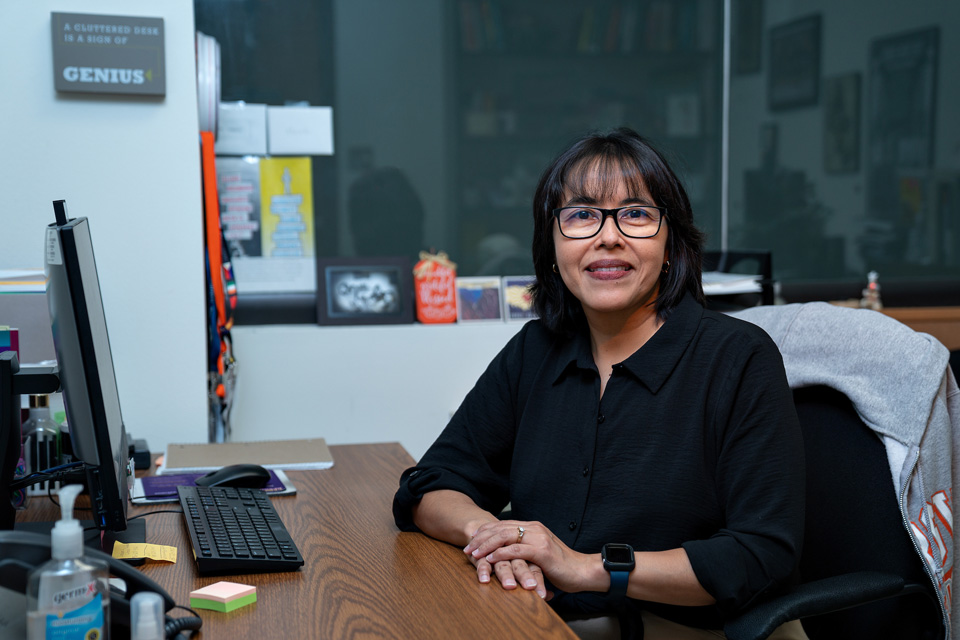- November 1, 2024
UTRGV’s Hebbard earns UT Regents Outstanding Teaching Award

By Amanda A. Taylor-Uchoa
From a yearlong academic strike that derailed her architectural aspirations in Mexico City, to becoming a celebrated educator at The University of Texas Rio Grande Valley (UTRGV), Marcela Hebbard embodies the transformative power of lifelong learning.
This month, The University of Texas System Board of Regents honored her dedication and innovative teaching methods with the prestigious 2024 Regents’ Outstanding Teaching Award (ROTA).
Hebbard, a lecturer in the UTRGV Writing and Language Studies Department, is one of only 12 educators across the UT System to receive this accolade, which recognizes exceptional classroom performance and commitment to student success.
A JOURNEY OF RESILIENCE
“I feel a mixture of emotions,” Hebbard said of the award. “This recognition is a significant milestone in my academic career. It validates the impact of my work and reinforces my belief in the value of my contributions.”
Her path to this honor was anything but conventional. Initially aspiring to follow in her father’s footsteps as an architect, Hebbard’s plans were upended by a strike in Mexico’s academic sector. Undeterred, she enrolled in a bilingual secretarial school, where tutoring a friend in English ignited her passion for teaching.
“These experiences influence my teaching methods, helping me empathize with students who may feel out of place in college or who see their languages as barriers to writing,” she said.
EMBRACING LIFELONG LEARNING
Hebbard’s teaching philosophy centers on the concept of lifelong learning – not surprising in an educator who herself has five master’s degrees, in:
- MA in Higher Education Administration, UTRGV (2023).
- MA in Interdisciplinary English Studies, UTRGV (2018).
- MA in English as a Second Language, UTPA (2012).
- MA in Biblical Studies, Dallas Theological Seminary (2003).
- MA in Cross Cultural Ministries, Dallas Theological Seminary (2003).
“Learning doesn’t stop at graduation – it’s a lifelong journey,” she said. “I want my students to understand that their learning won’t stop with graduation. By sharing resources and encouraging them to pursue their own interests, I hope to show them that there’s always more to discover.”
That philosophy resonates with her colleagues.
“Marcela is a reflective writing teacher who thinks deeply about how she affects her students’ progress,” said Dr. Colin Charlton, a professor and chair of the Writing and Language Studies Department. “She provides detailed feedback and helps students achieve recognition for their work at events like NovaRhet, our undergraduate research symposium.”
IMPACT ON DIVERSE STUDENT POPULATIONS
Hebbard, who grew up bilingual and navigated a variety of cultural landscapes, now leverages her experiences to connect with UTRGV’s student body.
“Professor Hebbard is an accomplished bilingual individual who deeply understands the bilingual mind,” said Dr. José Dávila Montes, interim dean of the College of Liberal Arts. “This perspective allows her to create an inclusive environment that resonates with UTRGV’s diverse student population.”
Hebbard emphasizes “translinguistic histories” in her teaching, encouraging students to view their linguistic and cultural backgrounds as assets, rather than obstacles.
“My goal is to help them value their unique linguistic experiences, whether they identify as bilingual or monolingual,” she said.
OVERCOMING CHALLENGES
Hebbard’s journey has been marked by challenges that have shaped her as an educator.
“Navigating a different educational system in the United States was difficult, as was dealing with self-doubt when I started teaching English composition,” she admitted. “But these challenges helped me empathize with students adjusting to new academic cultures.”
She recounted a poignant experience, of when a student’s family faced a devastating fire.
“I cried with the student, offered support, and reached out to the university’s emergency fund office,” Hebbard said. “This experience reminded me of the importance of being there for our students, not just academically, but emotionally and practically.”
Another defining moment was the loss of a student to suicide.
“This left me questioning my abilities as a teacher,” she said. “I sought counseling and connected with educators who had faced similar losses, which helped me rebuild my sense of trust in teaching.”
ADVOCACY AND FUTURE GOALS
As a UTRGV faculty senator and member of academic committees, Hebbard advocates for clear and consistent syllabi to create a fair learning environment.
“Teaching can sometimes feel like an isolated activity, and I want to connect with others to share ideas and experiences,” she said. As part of that sharing, she hopes to start a podcast focused on exploring the human aspects of teaching.
Her advice to new educators is straightforward: “Stay curious, reflect on your life experiences, and don’t be afraid to adapt your teaching style. Fostering curiosity and critical thinking is as important as covering the course material.”
A LEGACY OF EXCELLENCE
Dávila said Hebbard strives to keep her teaching up to date in an ever-changing environment of new technologies, student profiles and new pedagogies.
“While teaching a wide range of courses, she pursued studies beyond her existing five master’s degrees, pushing the boundaries of traditional learning frameworks,” he said.
UT System Board of Regents Chairman Kevin P. Eltife highlighted the significance of the award.
“Exceptional teaching is at the heart of our mission, and these award winners represent the highest ideals of education,” Eltife said.

